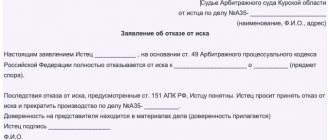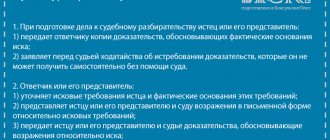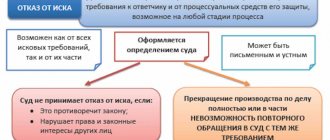After the court accepts the claim and even during the trial, the plaintiff has the right to clarify the claims. By way of clarification, you can point out new circumstances or supplement old ones, increase or decrease the amount of the claim, specify your requirements, change the legal basis of the claim.
The petition to clarify the claims is of a general, universal nature. At the same time, under the guise of clarifications, it is impossible to submit a statement of claim (new, not related to the original one).
As part of the preparation of a civil case, the court may make it clear to the plaintiff that the claim filed is not accurate. This clearly indicates the need to clarify the claims. Compose a document according to the sample below. The nuances can be discussed with the site’s on-duty lawyer.
:
Clarification of claims
When is it permissible to amend a claim?
In Russia, changes to the initially presented requirements are allowed in various cases, including in the system of courts of general jurisdiction. The provisions for filing a petition to amend claims are enshrined in the relevant regulations:
- in the arbitration process - Art. 49 Arbitration Procedure Code of the Russian Federation;
- in civil cases – Article 39 of the Code of Civil Procedure of the Russian Federation;
- in administrative – Art. 46 CAS RF.
According to current Russian legislation, the plaintiff has the right to change only the basis or subject of the claim, and also to increase or decrease the amount of compensation, the essence of the claim as a whole. However, it is impossible to adjust several points at the same time. If it is necessary to change both the subject and the basis, then a new claim is filed.
READ How to draw up an application to clarify claims to the court
The defendant and plaintiff can come to an amicable agreement. Refusal of claims is allowed at any stage of legal proceedings; adjustments to the claim in civil proceedings are allowed before the adoption of a judicial act.
READ Waiver of claims - how to draw up an application to the court
In both cases, the provisions must not contradict the law or violate the rights and legitimate interests of citizens. Otherwise, the judge will not accept the adjustment.
Changes in the process of examining the subject and basis of the claim are applied, in particular, when previously unknown facts are disclosed to the plaintiff or errors are made in preparing for the case. Despite the existing law, you should initially approach the preparation of the application responsibly.
Application Form
Filing a petition is permissible at any convenient time during the trial. Its author is not obliged to explain to the court the reasons for the decision.
Important! The law prohibits filing a new claim under the guise of clarification.
The petition to clarify the requirements contains the following information in the header:
- the name of the court receiving the appeal (it can be found on the official website of the justice authority);
- Full name of the author-compiler;
- his place of residence, contact telephone number;
- Full name and residential address of the defendant;
- cost of claim (not mandatory, but desirable).
Next, in the middle of the new line, the name of the document is written - “Change of claims.”
Changing the subject or basis of the claim
As when filing an application to open a case in court, also when applying to change the subject or basis of the claim, the plaintiff is faced with the task of considering the conflict that has arisen. First of all, you should understand the concepts:
- The subject of the claim is the legal right of the participant (plaintiff), which is protected in the process. That is what the lawsuit is about.
- Grounds – certain circumstances that led to the violation of rights. What you are guided by when filing a claim (evidence, circumstances, rules of law).
Only the plaintiff has the right to make adjustments to the claims; adjustments by the judge or the defendant are unacceptable. In order for a citizen to review a previously submitted application, it is necessary to analyze previous circumstances, add up the existing factors and identify shortcomings.
It is necessary to submit an application during court proceedings to change the basis of the claim if the factual circumstances that give rise to the applicant’s claims are revised. Subject – if substantive and legal requirements change.
Limitations of the law when clarifying claims, court refusal
The court has the right to refuse to clarify the claims of the plaintiff or his representative if the plaintiff, under the pretext of clarification, issues a new statement of claim.
It is important that the essence of the clarifications follows from the subject and basis of the claim and is directly related to the case under consideration.
If the clarification does not follow from the main case, then the court will not accept it, and will indicate to the plaintiff that this is a different claim and it can be filed according to all the rules as another claim.
That is, the court has the right to refuse if the plaintiff in the application simultaneously indicates a change in the subject and basis of the claim.
Therefore, before drawing up a petition to clarify the claim, it is better to consult with a specialist.
Increasing and decreasing claims
A petition in court is accompanied not only by indicating the grounds for the appeal, but also by a request for compensation for the violated rights of a citizen. The plaintiff independently indicates the amount, but during the case he can file an application to reduce or increase the claims.
In most cases, a reduction in stated claims occurs when the defendant partially compensates the amount before a decision is made in court. Increase - when recalculating penalties or fines at the current time of the case.
READ Drawing up and filing a claim to reduce the amount of alimony
The amount may also be reduced if the provisions of the claim are partially or completely waived. For example, if during the consideration of the case it turns out that compensation for moral damage in a particular case is impossible.
If the amount is reduced, the plaintiff may claim a refund of the state duty paid in excess of the established one. If there is an increase, the mandatory payment is completely shifted to the applicant.
Procedure for drawing up an application and state duty
The court will not accept any clarifications orally, so it is necessary to draw up a written petition. When drawing up a petition, it is important to take into account the general rules for writing appeals to the court. Mandatory information that must be in the document:
- plaintiff's details;
- full details of the civil case (number, full names of both parties, essence of the requirements);
- full name of the court;
- the main part, which indicates what is being specified in the claim and on what basis;
- the operative part, in which the plaintiff or his representative asks the court to accept clarifications of the claims; a list of clarifications made is also provided here;
- list of appendices to the application - at a minimum, there must be copies of applications for all participants in the process;
- date and signature of the applicant.
The following documents must be attached to the application:
- copies of the petition according to the number of respondents, as well as interested parties;
- if the application was submitted through a representative - a copy of the power of attorney;
- all supporting documentation with copies;
- calculation of amounts when it comes to reducing or increasing the amount of claims;
- if necessary, a receipt for payment of the state duty.
State duty:
- Additionally paid if the plaintiff has increased the amount of the claim. The missing amount of state duty is paid in accordance with the increased cost of the claim within the period established by subparagraph 2 of paragraph 1 of Article 333.18 of the Tax Code (within ten days from the date of entry into force of the court decision).
- If the plaintiff reduces the size of the claim, the amount of the overpaid state duty is returned in the manner prescribed by Article 333.40 of the Tax Code of the Russian Federation.
The consideration of the dispute over the claim will continue after the plaintiff pays an additional state fee, the issue of installment payment is resolved, or the court makes a decision to reduce the amount of the claim.
The applicant must necessarily clarify who is filing the application: the plaintiff or his representative, and also correctly formulate the essence of the clarifications on the claim. When clarifying the requirements for a new calculation of the amount, a complete scheme of new calculations for the claims is indicated on a separate page.
It is impossible to simultaneously change both the cause of action and the subject matter, completely changing the original requirements.
Settlement agreement
Instead of amending the claim, the parties may reach a settlement agreement. In this case, the plaintiff’s refusal of all previously stated claims is accepted, mutual concessions are made by each participant - the case is considered closed.
It is impossible for the plaintiff to make a similar petition to the court again.
The decision to reach an agreement between the parties must be balanced and deliberate. It is only possible to begin legal proceedings against the same defendant in the future only for other conflicts.
Some difficulties associated with the implementation of the possibility of introducing clarifications into the claim
The plaintiff may try to recover certain funds as damages, but during the course of the consideration of the case it will become clear that in reality unjust enrichment occurred. In this case, a determination arises that is not an amendment to the claim.
Arbitration courts, on the basis of Art. Art. 133 and 168 of the Arbitration Procedure Code of the Russian Federation, must independently determine the nature of the controversial legal relationship that has arisen between the parties to the case, as well as the norms of legislation to be applied. The fact that this is not related to the change in the claim, among other things, is indicated by the PP of the Supreme Arbitration Court of the Russian Federation dated November 16, 2010 No. 8467/10.
Moreover, under some circumstances, the court is even obliged to replace one defendant with another who is appropriate in the case.
It must also be borne in mind that in some cases the initiative to clarify the claim may come from the court, but clarifications will still be made by the plaintiff. The judge has the opportunity to invite the plaintiff to clarify the subject or circumstances, and the defendant to think over and change his objections to the entire claim or some part of it.
In this case, the general procedure for accepting applications is maintained, and this happens only at the stage of preparing the case. This is stated in clause 11 of the Decree of the Supreme Arbitration Court of the Russian Federation dated December 20, 2006 No. 65. The need for this is most often obvious. For example, if during the period after filing the application, but before the start of its consideration by the court, newly discovered circumstances appeared.
Procedure for changing a claim
The plaintiff can change the current claims in two ways:
- in writing - send a corresponding application to the court;
- orally - to announce the wish during the proceedings, the request is recorded in the protocol.
At the first stage - when requesting an amendment to the claim - the applicant will need to set out which specific points need to be adjusted. It is necessary to clearly indicate the details of the amendment, how the subject, basis or amount of compensation is changed.
If new details are discovered during legal proceedings, official confirmations are sent in addition to the statement of claim. It will be necessary to collect documentary evidence, for example, extracts from government agencies or examinations in special institutions.
At the second stage, a judge of a district court or other apparatus considers new information and analyzes existing and received information. When contacting the plaintiff, he can clarify the appropriate adjustments and explain his own position on this point.
The final stage is decision making. The adjustments made by the applicant are either accepted or rejected by the court. If the application is rejected, then the consideration of the existing case on its merits continues. Upon recognition, legal proceedings are resumed and new factors are taken into account.
Where to submit clarification of claims
An application to clarify the claims must be submitted to the court of first instance in which the claim was heard (arbitration court or court of general jurisdiction):
- transfer it personally or through a representative to the court office;
- at the beginning of the hearing in the hands of the judge;
- by mail, but the letter must in this case be valuable, registered, with notification;
- through the official portal of the court;
- using the Unified State Services Portal.
The number of applications submitted to clarify claims is not limited by law.
Sample
When drawing up a document, rely on a ready-made sample application for amending claims in administrative, arbitration or civil proceedings.
The presence of a template will allow you to avoid errors during registration and fill out the application in accordance with established standards. An example of a petition is presented at the link on our website.
In Russian legal proceedings, participants can repeatedly amend claims when new details of the case appear or an error is discovered. Repeated applications will be accepted until a final decision is made.
With frequent adjustments to the claim, a situation may arise when the competence of the judicial apparatus does not correspond to the current proceedings. To avoid possible difficulties, take a responsible approach to drafting a lawsuit or make adjustments only at the initial stages.
The Constitutional Court clarified the deadlines for clarifying the grounds for a claim to challenge the act of the election commission on the registration of a candidate
On January 20, the Constitutional Court of the Russian Federation issued Resolution No. 2-P in the case of checking the constitutionality of a number of norms of the Code of Administrative Proceedings regulating the procedure for considering administrative cases challenging the decision of the election commission on the registration of a candidate for deputy of a representative body of public power (candidate for an elective position).
Reason for applying to the Constitutional Court
A “self-nominated” candidate for the Duma of the city district “City of Chita” of the seventh convocation in a single-mandate electoral district, Lyudmila Tukhta, challenged in court the decision of the election commission dated July 24, 2021. According to the controversial decision, citizen K., nominated by the electoral association as part of the list of candidates, was registered as a candidate for deputy in the same electoral district.
In support of the administrative claim, Lyudmila Tukhta referred to the fact that K. did not provide a document recording the receipt and expenditure of funds from the candidate’s election fund. Her representative at the court hearing on August 6, 2021 added that K. did not provide documents confirming information about her main place of work or service, her application for consent to run for office included an incorrect address of residence, and the candidate’s criminal record contained no names articles of the Criminal Code of the Russian Federation, the very name of this Code was indicated in abbreviation. In addition, K. did not provide information about the date of expungement or expungement of her criminal record.
The court of first instance granted the claim, recognizing as fair the arguments about K.’s violation of the procedure for registering the receipt and expenditure of funds from the candidate’s election fund, about the failure to provide information about a criminal record to the extent required by law and documentation confirming the type of activity of the candidate for deputy.
Subsequently, the appeal overturned the decision of the first instance and refused to satisfy the claim, noting that failure to provide properly documented records of the receipt and expenditure of funds from the candidate’s election fund could not lead to a refusal to register him, and other additional grounds for canceling the decision of the election commission were stated by the representative of the plaintiff outside 10-day pretrial period, enshrined in Part 4 of Art. 240 CAS RF.
Since the Supreme Court refused to consider the cassation appeals of the applicant and her representative, Lyudmila Tukhta appealed to the Constitutional Court. In her complaint, she pointed out the unconstitutionality of Part 1 of Art. 46, parts 1 and 3 art. 62, part 4 art. 240 and part 1 of Art. 308 CAS RF.
According to the applicant, the disputed norms do not comply with the Basic Law of the state to the extent that, in their literal meaning and in the meaning given to them by law enforcement practice, they limit the right of an administrative plaintiff to add or change the grounds for an administrative claim after 10 days from the date of adoption by the election commission the contested decision on registration of a candidate for deputy. In addition, they also allow for restrictions on the principle of the active role of the court when courts consider administrative cases challenging decisions of election commissions on the registration of candidates for deputies.
Findings of the Court
After studying the materials of the case, the Constitutional Court noted that the subject of consideration is Part 1 of Art. 46 and part 4 of Art. 240 CAS RF to the extent that, in accordance with them, the court, when considering an administrative case challenging the decision of an election commission to register a candidate for deputy of a representative body of public power (a candidate for an elective position), resolves the issue of considering additional grounds for an administrative claim declared by the administrative by the plaintiff after the expiration of the 10-day period for filing a claim.
The Supreme Court recalled that judicial protection of electoral rights in the event of their violation should be available throughout the entire election campaign for all voters, candidates for deputies, political parties and other subjects of electoral legal relations. At the same time, the legislator is obliged to ensure the timeliness, competence and fairness of judicial proceedings in electoral disputes.
As the Constitutional Court explained, according to Part 1 of Art. 241 CAS RF (as amended in force until July 31, 2021 and applied in the applicant’s case), unless otherwise provided by this Code, a claim for the protection of electoral rights brought to court during the election campaign before voting day must be considered and resolved within 5 days from the date of its receipt, but no later than the day preceding voting day. Accordingly, a claim received on the day before voting day, on voting day or on the day following voting day is considered and resolved immediately. If the facts contained in the claim require additional verification, it must be considered and resolved no later than 10 days after the date of its filing. The expiration of these deadlines does not entail the termination of proceedings in a case initiated on a claim received in accordance with the requirements of Art. 240 CAS RF, and does not prevent the courts (including higher courts) from resolving this case on the merits.
“The legislative establishment of shortened deadlines for judicial challenges to certain types of decisions of election commissions made within the framework of election campaigns, and the deadlines for court consideration of relevant applications, is predetermined by the strict time frame of the electoral process and the need for the prompt resolution of electoral disputes. This is what the legislator is guided by by the Convention on Standards of Democratic Elections, Electoral Rights and Freedoms in the Member States of the Commonwealth of Independent States, which stipulates that when holding fair elections, prompt and effective consideration by courts (other authorized bodies) of complaints about violations of the electoral rights and freedoms of citizens must be ensured. , candidates, political parties (coalitions) within the time frame of the relevant stages of the electoral process,” the Court’s ruling noted.
The Constitutional Court added that changing the basis of the claim is an administrative right (action) of the administrative plaintiff and may consist of adding or changing the previously specified circumstances confirming the claims, or excluding certain of them. It is intended to eliminate omissions in the claim filed by him, as well as to take into account the circumstances that were identified during the consideration of the administrative case by the court of first instance.
“The right of an administrative plaintiff who is a candidate for deputy (for an elective position) to change the basis of the claim to challenge the decision of the election commission to register another candidate is significant, among other things, because a number of evidence in the case, on which the content of the claim depends, can often be found from the administrative defendant - the election commission, as well as from authorized bodies and officials. Such evidence may become the subject of judicial proceedings and the reason for the administrative plaintiff to change (add) the basis of his statement of claim after they are demanded by the court (Article 63 of the CAS RF),” the Constitutional Court emphasized.
At the same time, the Court noted that the established judicial practice (which includes judicial acts in the applicant’s case) proceeds from the fact that if the administrative plaintiff’s petition to change the cause of action to cancel the decision of the election commission to register a candidate is filed during the consideration of the case by the court of first instance after the expiration of the established part 4 of Art. 240 CAS term, then the administrative claim cannot be satisfied on the changed (additional) grounds.
Accordingly, the interpretation in judicial practice of the provisions of Part 1 of Art. 46 and part 4 of Art. 240 of the CAS as excluding the possibility of the court considering changed (additional) grounds for canceling the decision of the election commission on the registration of a candidate for deputy (for an elective position) from the moment of expiration of the established deadline for filing a claim means an actual revision of the period introduced by law for the administrative plaintiff to exercise the right to change (add) the grounds claim. Due to this interpretation and taking into account the relationship between the time limits established by the CAS for filing an administrative claim and its consideration by the court, the administrative plaintiff may be deprived of the right to change the grounds of the claim even before the court begins to consider the case on the merits, and even before the court will accept this claim for consideration. Meanwhile, the right to judicial protection includes not only the right to go to court, but also the opportunity to effectively use the powers of the party that procedural legislation gives it.
Thus, the Constitutional Court recognized the controversial norms as consistent with the Constitution of the Russian Federation, since they cannot be regarded as excluding the right of an administrative plaintiff after the expiration of the period established by Part 4 of Art. 240 of the Code, to change (add) the grounds for an administrative claim before the adoption of a judicial act, which ends the consideration of the merits in the court of first instance of the case challenging the decision of the election commission on the registration of a candidate for deputy of a representative body of public power. These legal provisions cannot be considered as excluding the possibility of the court satisfying an administrative claim on these amended (additional) grounds. At the same time, the court is not deprived of the opportunity, when an administrative plaintiff puts forward additional grounds for an administrative claim, to take into account their legal validity and confirmation by admissible and relevant evidence and - taking this into account, as well as the time frame of the election process and the need for a prompt resolution of the case - to resolve the issue of the need to require evidence .
The Constitutional Court also refused to review the applicant’s case due to the completion of electoral legal relations and did not identify the possibility of using compensatory mechanisms in the case under consideration.
The applicant's representatives commented on the decision
In a commentary to AG, lawyer of the Novosibirsk Region Administrative Office Svetlana Testova and director of the Anti-Crisis Center legal agency Sergei Podyapolsky, who represented the interests of Lyudmila Tukhta in courts of various instances, as well as in the Constitutional Court, explained the reasons for the appeal. “Candidates and electoral associations have the right to challenge decisions of election commissions on the registration of other candidates and electoral associations. The grounds are mainly related to incorrect execution of documents that are in the election commissions, which are administrative defendants in cases of this category,” they indicated.
Lawyers noted that the possibilities for pre-trial familiarization with the documents of opponents are limited: “A candidate or electoral association has the right to appoint a member of the commission with an advisory vote, who has the right to familiarize itself with the documents. The law does not specify the exact period within which documents must be submitted, prevents the receipt of copies of most documents, and does not establish a procedure for familiarizing with them. Moreover, by-laws are being adopted that delay the deadline for submitting documents, prohibit not only taking photographs, but also taking notes during familiarization and even simultaneously viewing two documents, comparing their contents.”
Svetlana Testova and Sergei Podyapolsky added that practicing electoral lawyers have more than once encountered a situation familiar to many lawyers practicing in criminal cases: “If you point out violations to the investigator before the trial, then most likely they will be corrected, perhaps even by replacing documents. And if a lawyer in this situation can have at least photographs “as a souvenir,” then an electoral lawyer is prohibited from taking photographs.”
“At the same time, over the past 2-3 years, judicial practice has developed that prevents administrative plaintiffs from changing the grounds of claims. Imagine: on the judge’s desk there are documents from which it follows that the candidate is registered illegally. But the court says to this: you do not have the right to change the grounds for the administrative claim, because more than ten days have passed since the decision was made. What is this, electoral humanism? But why, given the same violations, are some candidates denied registration, while others are registered, and the court turns into a statistic? Who controls the commission controls the court? But what about the principle of the active role of the court enshrined in the CAS RF?” - they asked themselves questions.
Representatives of Lyudmila Tukhta especially noted the position of the Constitutional Court that changing the grounds of an administrative claim is permissible before a decision is made by the court of first instance: “This means that the right to change the grounds of a claim is not limited to 10 days from the date of the decision. At the same time, it is a pity that the reasoning part of the resolution did not include our arguments regarding the active role of the court. Apparently, this issue requires in-depth study. In addition, questions remain regarding the procedure for requesting evidence. Nevertheless, in general, the result was achieved. The adopted resolution of the Constitutional Court of the Russian Federation should make elections more competitive"
AG experts commented on the Constitutional Court’s findings
Legal lawyer Artem Berlin noted that the Constitutional Court considered a very original facet of the problem of individualizing a claim. “As is known, the identity of a claim is predetermined by the totality of its subject and basis; the period for applying to court is interrupted at the moment the claim is filed; The plaintiff has the right to change the subject or basis of the claim (but not both elements at the same time) before the final judicial act is adopted. The Plenum of the Supreme Court of the Russian Federation spoke about the limitation period in the sense that a subsequent change by the plaintiff in the circumstances on which he bases his claims (i.e., the grounds for the claim) does not affect the limitation period - the plaintiff continues to protect the same interest (clause 14 of the Resolution Plenum of the Supreme Council dated September 29, 2015 No. 43),” he explained.
According to the expert, meanwhile, in relation to election disputes, a different approach has developed in practice: changing the basis of the claim is allowed only within the shortened 10-day period for going to court. “As the Constitutional Court noted, thereby the right to amend the claim is actually emasculated, because often this period expires even before the application is accepted for consideration. The Constitutional Court, in my opinion, rightly indicated that the right to judicial protection includes not only the right to go to court, but also the opportunity to effectively use one’s administrative powers insofar as the person’s protected interest remains unchanged (in the case considered, the removal of a competing candidate from elections), changing the grounds of the claim should be allowed by the court without raising the question of the deadline,” concluded Artem Berlin.
Lawyer of the St. Petersburg AP Anton Lebedev noted that although the resolution in its essence does not indicate a contradiction with the Constitution of the provisions of Art. 46 and 240 CAS, in fact, the Court allows the possibility of supplementing the contested norm with requirements for an administrative claim and indicates the need for an objective consideration of additional grounds for such a claim.
“It was quite rightly noted that additional grounds for challenging may appear during the consideration of the case, as a result of the collection of additional materials. Applying a shortened appeal period to them may not allow real violations identified outside the shortened period to be brought up for discussion in court,” concluded Anton Lebedev.
Submission and review
You can submit a petition an unlimited number of times at any stage of the consideration of the case (until the court retires to the deliberation room). A written form of the document is preferable, but a petition can be made orally in the courtroom with a written copy provided for attachment to the case file.
The document can also be submitted to the court office (the clerk is required to put a receipt mark on the copy of the plaintiff’s petition) or sent by mail with a notification of receipt and a list of attachments.
After filing a petition, the court has the right to postpone the court hearing for a certain period of time to become familiar with new facts and clarifications in the case.
Based on the results of reviewing the document, the court issues a ruling. Without it, the application will be considered rejected.
Defendant's position
If we consider the same situation, the defendant has the right to go to court with a similar demand to reduce the cost of the claim. Sample document:
In...court...area...
Details of the defendant and plaintiff...
Title of the document
Addition to...
In addition….name of the plaintiff…to….name of the defendant…about collection….brief essence…, I inform you that…date…reconciliation of mutual settlements was carried out, the results of which showed that the amount of the principal debt is….rubles.
Thus, the demand for the recovery of...rubles is considered unfounded. Therefore, I ask you to reduce the amount of claims taking into account the information contained in the reconciliation report between the plaintiff and the defendant.
Applications…
Signature, date.
Sample document
When drawing up an application, you can use the following example:
In...court...area...
Details of the defendant and plaintiff...
Title of the document
According to the statement of claim filed by the plaintiff.... to the defendant...the amount of the principal debt amounted to....and a penalty in the amount of....rubles.
After reconciliation of mutual settlements….date…the amount of the principal debt was clarified and amounted to….rubles. Accordingly, the amount of the penalty has also changed and amounts to... rubles. The total amount of claims today is... rubles.
Based on the above, I ask you to reduce the claims and recover from the defendant... rubles.
In addition, I ask you to additionally oblige the defendant to pay the plaintiff’s expenses that he incurred in connection with the involvement of a lawyer in the process. The lawyer's fee is... rubles.
Applications:
- Reconciliation act between...
- A copy of the agreement with the lawyer...
Signature of the applicant and date of preparation.









